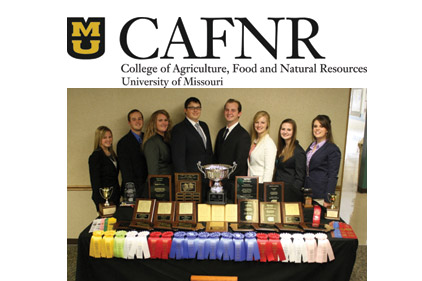 The University of Missouri is unique in that the meat science faculty is split between the Animal Science and Food Science programs. There are three meat science faculty members at the MU College of Agriculture, Food and Natural Resources: Carol Lorenzen, Professor in Animal Science focuses on beef tenderness; Bryon Wiegand, Associate Professor in Animal Science focuses on fat quality in pork and beef; and Andrew Clarke, Associate Professor in Food Science focuses on processed meat. They are nationally recognized for their research and classroom contributions.
The University of Missouri is unique in that the meat science faculty is split between the Animal Science and Food Science programs. There are three meat science faculty members at the MU College of Agriculture, Food and Natural Resources: Carol Lorenzen, Professor in Animal Science focuses on beef tenderness; Bryon Wiegand, Associate Professor in Animal Science focuses on fat quality in pork and beef; and Andrew Clarke, Associate Professor in Food Science focuses on processed meat. They are nationally recognized for their research and classroom contributions.
Most of the applied research conducted at Mizzou is industry funded. The meat science program addresses timely questions that have recently included the impact of feeding dried distiller’s grains in combination with growth agents to swine on meat quality and different combinations of muscles or fat sources on the shelf life of ground beef. Other research contributing to research methodology development and adoption included a comparison of different fat determination methods, and combining two shear force methodologies in one steak.
Current course offerings range from meat evaluation, meat science, meat processing; and growth and development. Within Animal Science there is the option to specialize in animal products. Youth outreach programing encompasses meat judging and country cured ham projects. Other extension programs include HACCP training, food defense, and Show Me Beef University. In 2000 a new meat laboratory facility was completed giving the meat science program 13,200 square feet of harvesting, processing and classroom space. The annual processing capacity is 400 hogs, 90 cattle, 50 sheep and 30 goats; these animals are used conduct research and teach courses.
The University of Missouri takes pride in is providing “hands on” training through the meat lab, meat science research laboratory experience, and the collegiate meat judging program. The meat lab employs about 15 undergraduate students every year, and these students work in all aspects of the business from harvesting and processing to sales and sometimes helping teach a class. The majority of these students have no real meat experience when they start work, and they grow to understand and take a real interest in the meat industry with a number of them working in the meat industry upon graduation.
“As a student at the University of Missouri, I was provided with opportunities that allowed me to gain knowledge of industry practices and the research to support them, as well as networking, that has allowed me to be competitive in the job market and land a dream job,” said Callie Perkins, Enforcement, Investigation, Analysis Officer for Missouri Meat & Poultry Inspection Program.
One other aspect of the laboratory experience is that these students are encouraged to present their research at regional and national meetings. Students who participate in collegiate meat judging have the opportunity to travel the Midwest, Southwest and East Coast for contests and experience a variety of different meat processing plants. These students not only get to see the variety that the meat industry has to offer, but they also hone their communication skills and network for future career opportunities.
Students interested in the meat or dairy products are also encouraged to join the faculty on International Study Abroad trips to either Germany or New Zealand to experience these industries from a new perspective.
University of Missouri is a member of the American Meat Science Association. For more information about the Purdue University and its faculty, please visit the AMSA website at http://www.meatscience.org/page.aspx?id=9442.





Report Abusive Comment